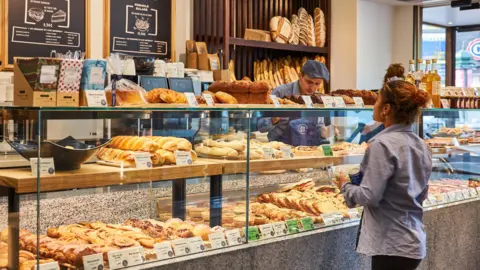In the bustling world of culinary innovation, the Korean bakery chain Paris Baguette has carved a niche for itself, boldly declaring that croissants and other pastries need not be confined solely to their French heritage. This statement encapsulates the ethos of the brand, which is a product of the SPC Group, a company rooted in a family bakery that blossomed into a global enterprise over the span of 80 years. With its vibrant presence in countries across continents, Paris Baguette appeals not only to those nostalgic for traditional French baked goods but also to a new generation embracing a multicultural palette.
When you step into any of the bustling Paris Baguette outlets, adorned in shades of blue, red, and white reminiscent of the French tricolor, you may be struck by the ambiance meant to invoke the charm of a Parisian café. However, the reality is that this establishment is unmistakably Korean. The company’s CEO, Jin-soo Hur, emphasizes that the bakery is a proud global brand, asserting that products like croissants should be viewed as universal rather than strictly European. His conviction that the bakery should not limit itself to one region’s staple items underscores the expansive vision of SPC, which achieved notable profits to the tune of $5.6 billion last year.
Paris Baguette, established in 1988, emerged as a trailblazer by becoming the first Korean bakery to open international locations, initially in China, and has since expanded to 4,000 stores in 14 countries including the United States and Europe. Their international initiative is ambitious, with plans to establish over 1,000 additional branches globally by 2030. A key part of this expansion is their investment in a new factory in Texas, designed to be their largest overseas production facility. This endeavor primarily aims to service markets in the U.S., Canada, and Latin America, marking a significant step in cementing their presence in the American culinary landscape.
At the heart of Paris Baguette’s strategic approach is a collaboration with sports, particularly their connections with renowned sports teams such as the English Premier League club, Tottenham Hotspur. This partnership not only boosts the bakery’s visibility but fosters a cultural connection through shared experiences surrounding football, especially as South Korean superstar Son Heung-min leads the team, reflecting the growing nexus between food and cultural identity.
As consumer preferences evolve alongside rapid urbanization, the demand for convenience foods has surged, particularly in Asia, where bakeries are quickly adapting to offer diverse flavors that resonate with local tastes. Paris Baguette is at the forefront of this trend, offering a unique blend of French culinary techniques and Asian flavors, such as pandan and durian, to attract a myriad of customers. Their halal-certified production facility in Malaysia signifies the company’s commitment to catering to diverse dietary preferences while maintaining cultural sensitivity.
However, the mass production of baked goods has sparked debate regarding quality. Bakeries, including Paris Baguette, often utilize frozen dough to ensure efficiency and extend shelf life. Culinary experts have raised concerns whether this method can match the artisanal quality often found in traditional bakeries. Chef Saveria Busato from the Culinary Institute of America highlights the disparity, critiquing the quality of frozen dough while acknowledging that consumers are willing to embrace new tastes, especially when inspired by popular culture, including Korean dramas and cuisine.
The ongoing challenges posed by the global economic environment, including inflation, are significant concerns for Paris Baguette as it seeks to penetrate the American market. Despite competition from brands like Pret A Manger, which have had to adapt their business models post-COVID, Hur remains focused on prioritizing cultural exchange and the promotion of global bread culture over mere profitability.
Ultimately, Paris Baguette represents a cultural fusion, blending traditional baking artistry from France with innovative Korean flair. Its ambition transcends the desire for financial gain; instead, it endeavors to enrich global culinary experiences, making its mark on the world stage one croissant at a time. With such a rich tapestry of flavors and cultural significance, the future of Paris Baguette seems destined to rise, much like the pastries they serve.



